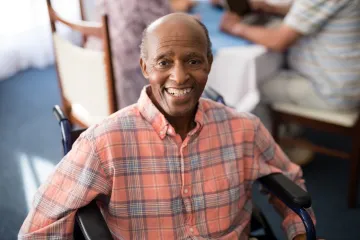ACOA/MSTEM Thrive Program
An Exciting New Opportunity for YOU as an Undergraduate Student from an Underrepresented Group

The ACOA/MSTEM Thrive program is designed to prepare you to enter a graduate program in the sciences with tools to pursue a career in research in aging.
You and your future research can make a difference for the health and well-being of older adults in your family and community.
Program Goal: Increase the diversity of scientists who do biomedical, behavioral and clinical research on improving the health and well-being of older adults in diverse groups.
Why should you focus your career on older adults in diverse groups?
- The number of older adults in diverse groups is growing. By 2050, nearly half of the 55+ population will be from diverse groups.
- Older adults in diverse groups experience persistent health disparities such as lower life expectancy, higher rates of diabetes and cardiovascular disease and other disabling conditions.
- Some older adults, like those living in the border region and rural areas, also have socio-economic and geographic health-related challenges that affect their well-being and aging.
- Career opportunities in the field of aging have never been greater.
Why is a career in research on aging in diverse groups important for you to pursue?

- The goal of research on aging is to improve the health, well-being and independence of older adults, whether the research focuses on the cellular level, the personal level, the societal level or the institutional level.
- Aging in diverse groups is strongly influenced by environmental, social, cultural, behavioral, and/or biological factors that create and sustain health disparities. Since most research has focused on aging among older adults in the “dominant groups,” many of these factors are poorly understood.
- Using YOUR talents to make new discoveries about the bio-psycho-social and contextual origins, treatment and management of health disparities affecting older adults has never been more needed.
Why your voice is needed to improve the health, well-being, and independence of older adults in diverse groups?
- Currently research scientists are not a very diverse group. You can change that!
- As a scientist, you can research critical questions about the relationships among health disparities, belief systems, and genetic and socioeconomic differences that may be overlooked by other scientists.
- You will be able to use your voice to help other scientists understand the complexity of the health problems affecting older adults in diverse groups.
- You can make a difference for the older adults in your family and your community.
What do you need to do to take advantage of this exciting opportunity?
- Confirm you are an undergraduate student (preferably freshman) from a disadvantaged background (FAFSA/Pell Grant eligibility and first-generation status) or from an underrepresented group in the health sciences (American Indian/Native American, African American and Latino background) or have a disability that substantially limits one or more major life activities. Confirm you are a US citizen or permanent resident.
- Make an appointment by contacting our program coordinator:
- Margaret Proffitt at margaretproffitt@arizona.edu
- Before the meeting think about:
- The health challenges experienced by older adults in your family or your community.
- Your own future career goals or interests.
- How your goals and interests in the health challenges of older individuals in your family and community might come together in planning for a career as a scientist.
- At the meeting you will be given more details about the program and application requirements.
We are looking forward to talking with you about your future goals and aspirations!
Sponsored by an R25 grant from the National Institute on Aging MSTEM: Advancing Diversity in Aging Research through Undergraduate Education Initiative

